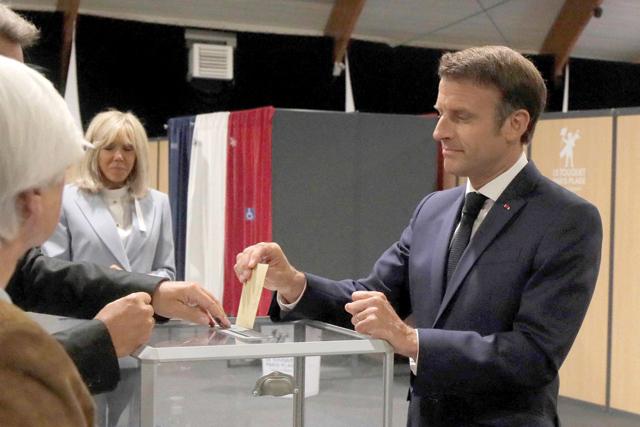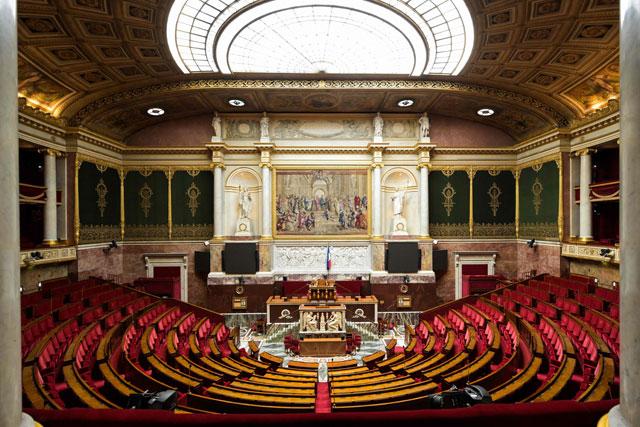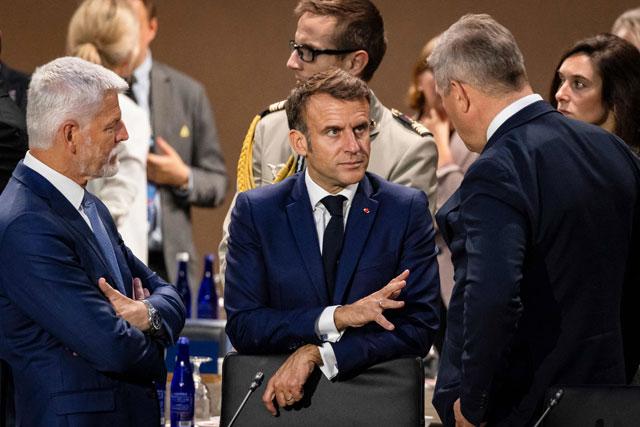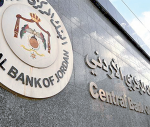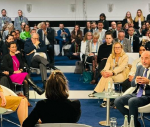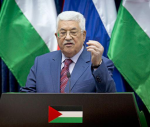You are here
Macron meets opposition chiefs to break French political deadlock
By AFP - Aug 31,2023 - Last updated at Aug 31,2023

President of French far-right party Rassemblement National Jordan Bardella (2nd right) arrives to attend the ‘Rencontres de Saint-Denis’ meeting at the Maison d'Education of the Legion of Honour in Saint-Denis, on the outskirts of Paris, on Wednesday (AFP photo)
PARIS — President Emmanuel Macron met leaders of all of France's political parties on Wednesday, including his most bitter opponents, outside Paris in a bid to break the deadlock of a hung parliament.
Deprived of an absolute majority in the national assembly lower house since last year's parliamentary elections, Macron said he wanted a "frank, honest and direct discussion" aimed at "acting together" for the benefit of voters.
In a letter inviting party bosses from the hard left to far right, Macron vowed to work together on writing new laws and "if need be" organising referendums — a rare political tool that has previously backfired.
"We're here with no illusions, but with determination," said Manuel Bompard, coordinator of the hard-left France Unbowed, as he and other left-wing leaders from the NUPES alliance arrived on Wednesday afternoon.
"Any time we can come and make concrete proposals, we'll do it," added Socialist chief Olivier Faure.
Jordan Bardella, head of the far-right National Rally (RN), told reporters on Wednesday marked "an opportunity for a frank discussion", saying he wouldn't be "the most lenient" with Macron.
The talks are set to unfold behind closed doors with participants surrendering their phones.
One idea under discussion is the government organising what has been dubbed a "preferendum" — a non-binding public consultation that would offer voters multiple choice questions on issues such as immigration or education.
Traditional one-question, yes-or-no referendums have in the past seen voters seek to censure the president himself, tripping up Francois Mitterrand and Jacques Chirac on European issues in 1992 and 2005.
"By asking several questions, people may vent on one of them and respond on the issues on all the others," government spokesman Olivier Veran told broadcaster BFMTV on Monday.
Conservatives and the far right have already called for referendums on immigration while the NUPES alliance of left parties wants voters to have a direct say on Macron’s already-passed controversial pension changes.
Macron’s Renaissance party would prefer a referendum with “between three and five questions”, including on institutional reform.
“It’s a way to regain legitimacy if people vote yes,” one senior Renaissance MP said.
On the other hand, “if this new ‘democratic innovation’ is a damp squib, Emmanuel Macron will have no levers available to save his second term from getting bogged down,” the daily Le Monde commented.
Constitutional lawyers have also raised doubts, with expert Bertrand Mathieu telling Le Monde the idea amounts to “a never-before-seen procedure, a kind of life-size poll organised by the state”.
“Nothing would bind the legislative and executive branches afterwards, and no-one would be able to call on the Constitutional Council to insist the ballot box is respected,” he added.
The political leaders are meeting in Saint-Denis just outside Paris, a poor suburb hit by riots in late June and early July over the police shooting of a teenager of Algerian origin during a traffic stop.
Two roundtables will cover international affairs and possible institutional reforms, with a later dinner covering the problems highlighted by the riots: Education, integration, inequality and “authority”, the president’s Elysee Palace office said.
Macron’s centrist minority government appears to have run out of road with its strategy of bill-by-bill alliances and use of an unpopular mechanism to ram laws through without a vote, especially to pass contested pension changes earlier this year.
Now the president “wants to avoid blockages by any means available”, a senior member of his entourage told AFP.
Macron “wants to see where there are disagreements, and if they cannot be overcome, see what subjects French voters could decide on” in a referendum.
Related Articles
PARIS — French President Emmanuel Macron on Sunday faced a challenge from a newly formed left-wing alliance in parliamentary elections that
PARIS — French parties sought to project strength and gather allies on Tuesday, with the government adrift following an election in which no
PARIS — President Emmanuel Macron on Wednesday put responsibility on parliament to negotiate a broad coalition reflecting France's "republic


